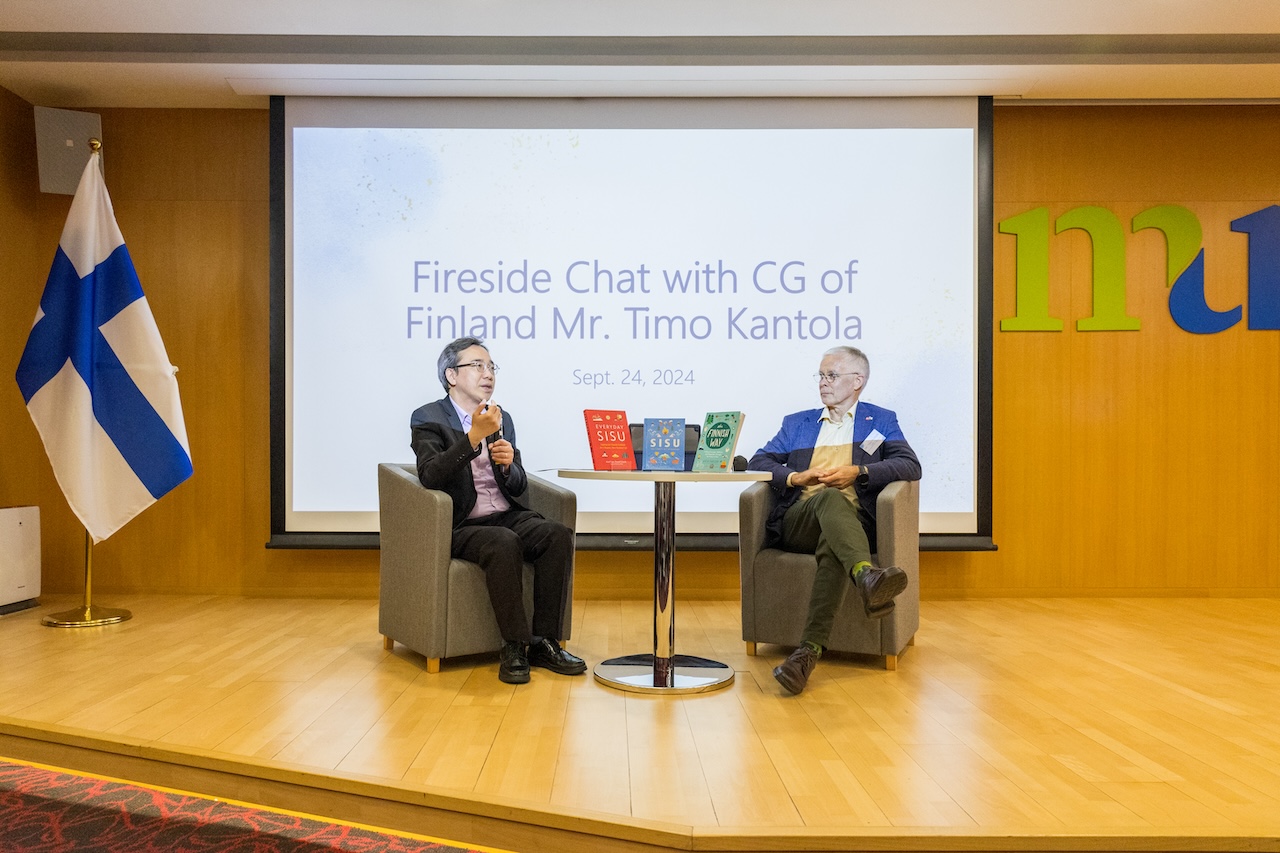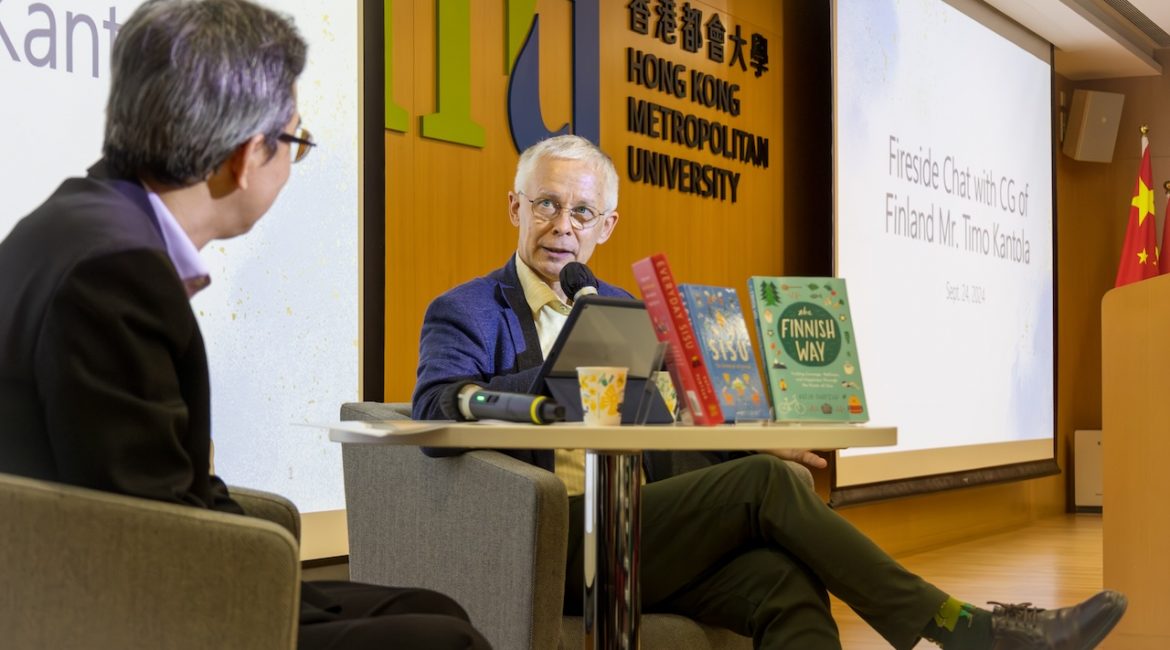The Finnish consulate in Hong Kong has an interior that is simple and unpretentious, yet exudes light and natural calm and beauty. On the wall of the meeting room for visitors is framed an unadorned photograph of Alexander Stubb, the current president, with only his signature. Of all the consulates I have visited in the city, Stubbs’ smile is probably the most radiant, silently inviting his visitor to get out there, touch some grass, and run a marathon (that’s just the impression I get). A triathlete, Stubb no doubt is passionate about his pastime, and he would likely say that loving and enjoying something beyond work actually boosts his political vocation. Being devoted to a sport or hobby happens to be part of the Finnish mindset of sisu, which captures in one word the primary state of being or flow that Finns credit for being able to be happy amidst testing circumstances.
The current consul-general, Mr. Timo Kantola, has run marathons with Stubb and is himself a passionate runner. In September, Mr. Kantola was invited to give his thoughts on sisu during a fireside chat at the Li Ka Shing School of Professional and Continuing Education (LiPACE) at Hong Kong Metropolitan University. (HKMU) The university is collaborating with a series of consulates in the Asian hub to introduce students to diverse cultures around the world. Mr. Kantola is therefore well positioned to interface with Hongkongers: having joined his country’s foreign office in 1988, he has had a wealth of experience representing Finland to other nations. He became Finland’s consul-general in Hong Kong in 2022.
For him, sisu is a natural-born characteristic, rather than some philosophical concept or national value. “It was enlightening for me to participate in this event because it was an opportunity to articulate sisu to Hongkongers. In Finland it is not something we consciously discuss,” he told me when I visited the consulate last month. In this sense, sisu is a somewhat slippery and subtle concept.

Perhaps sisu is best translated as perseverance or resilience that manifests in the face of challenges. He gives the example of the Finnish winter and rain as a constant backdrop in which sisu must be summoned for things to get done. “Certainly, it is a different thing to values such as diligence or being hardworking. There is a subtle difference. If you have lots of work to do, you’ll be stressed and I don’t think one can say that this would be solved by sisu.” He uses the analogy of the old Finnish pastime of pilkki, or fishing on ice. “To get through the ice takes hours. That resolve and patience could be said to stem from sisu. Or perhaps it could be likened to riding a bicycle, and children inevitably need to fall down a few times before riding a bike becomes natural.” In some ways, this is a kind of mindfulness and focus that might be directed more toward an outside source.
Mr. Kantola says that sisu is conducive to not only perseverance, but the related virtue of openmindedness, to try different pathways to success. But when does sisu become something more negative, specifically, stubbornness? In Buddhist thought, stubbornness could be seen as an aspect of attachment. Might sisu overlap with any similar ideas concerning nonattachment? Mr. Kantola suggests that one important part of teaching children, which he does with his longtime wife, is helping the kids navigate inevitable disappointment. This has implications for society at large and how we see ourselves in relation to our fellow citizens. “Many things about sisu come down to your inner, personal moral values. How you behave. So sisu can be used in a way that is good for the community and not just benefiting oneself.”
The Finnish closeness to nature and the wilderness is akin to retreating from busy cities like Helsinki (or Hong Kong) and meditating, reflecting. “It may somehow contribute to sisu because, as an inherent characteristic, sisu can be nourished through meditation or just by being yourself. When you’re on your own in the forest, rowing on a lake alone, or ice fishing in the winter, you can be your own thoughts, focusing on doing one thing only. Even the traditional sauna culture, notwithstanding tour groups, is actually based on respectful quietude and enjoyment of the hot steam. It should be a place of solitude.” These examples allow Finns to take some distance from the stress of daily life, to simply stop. This, for Mr. Kantola, is important to the Finnish idea of sisu and happiness in general.

One of sisu’s most important qualities or characteristics is how it empowers people to create their own conditions for happiness, rather than relying on external validation. In modern life, much of our self-identity and pursuit of wealth and status is dependent on our work, but Mr. Kantola advises that sisu can help us think of our jobs differently, especially jobs in which the contents are not rewarding. “That is just a fact,” he observes, “and people need to consider if they can think of their work in a way that is rewarding. I always say to my younger colleagues that at the end of the day, the salary is not the most important aspect of the job. The most important part is that you have a good feeling when you enter your workplace or open the door in the morning. If you feel depressed, tired, or fed up when you do, then something must change.”
Respecting what one does, even if it is relatively mundane like washing dishes or other manual labor, is another quality of sisu. Certain roles might be dull or unglamorous, but if a community of work can be proud of its contribution, our everyday relationship or attitude to that work can become more fulfilling and encouraging. Reconceptualizing the content of one’s work is critical in a conventional world where different roles inevitably exist. It does not necessarily mean frustration and happiness can be overcome by sisu (Mr. Kantola concedes that there may be structural problems), what ties all these subtle instincts and ideas together is the feeling of control we feel can exert over our lives, despite the many circumstances beyond our control: to which parents and country we were born, the culture we grow up in, the schools we are sent to.
“Sisu is always there with us,” concludes Mr. Kantola. “It is an internal characteristic and in the Finnish vision of happiness, people feel in control of their physical and mental space, and therefore their lives. You might not always be the boss, but you have a space in which you can be your own boss, to be masters of your own destiny.” This is similar to a healthy view of karma. “We cannot control of what has already passed, but we can lay the grounds of our future by setting the bar for ourselves. That is sisu. If you let other people or fancy magazines or social media set the bar, then you’ll never feel satisfied. If you can set the bar yourself, you have some degree of control and you can enjoy happiness on your own terms.”
See more
The Culture Show with Mr. Timo Kantola, Consul General of Finland in Hong Kong
Related blog posts from BDG


